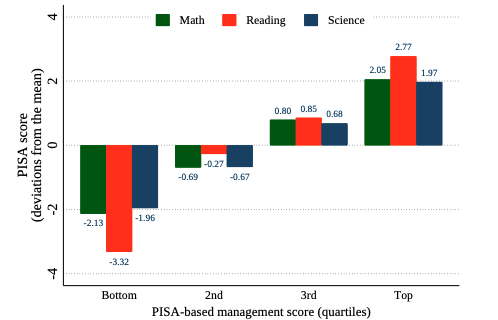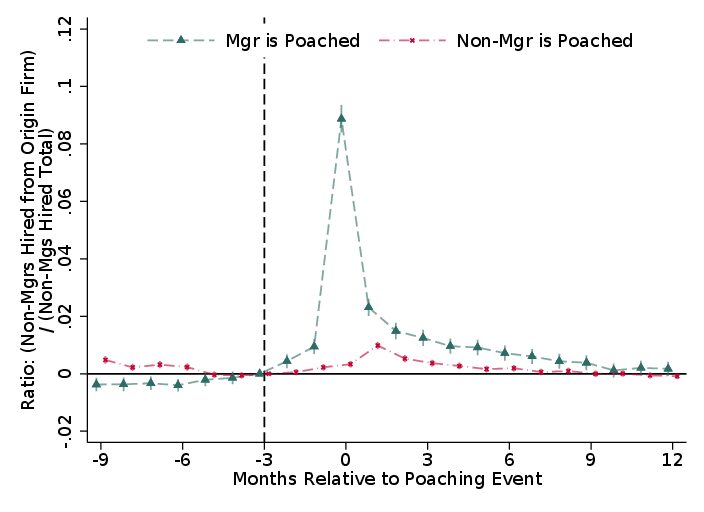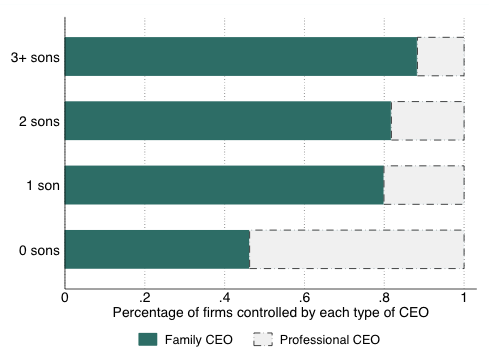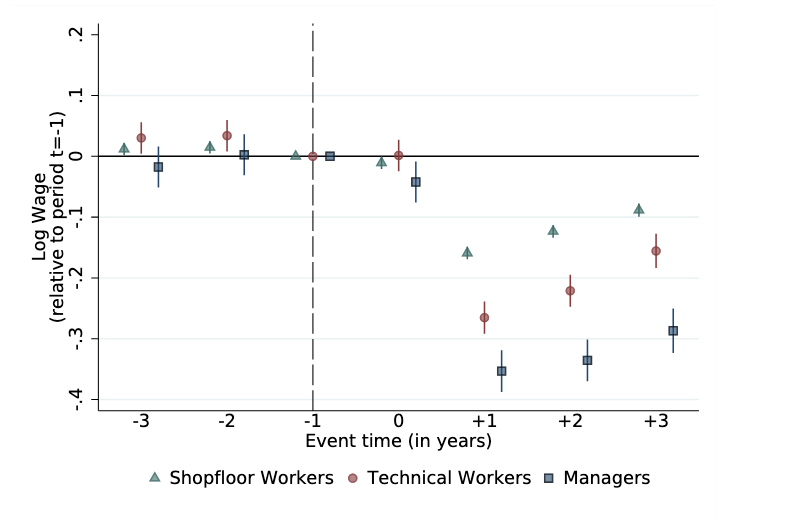Understanding school management with public data: A new measurement approach and applications (R&R at JPE Micro)
with C. Leaver and R. Lemos
WORKING PAPERS

Why do students learn more in some schools than others? One consideration receiving growing attention is school management. To study this, researchers need to be able to measure school management accurately and cheaply at scale. We introduce a new approach to measuring management practices using existing public data and exemplify the methodology with OECD’s PISA and Brazil’s Prova Brasil. Both indices show a strong, positive relationship between management and learning. We highlight two example applications: an extension of the Ahktari et al (2022) analysis of political turnover and student learning, and an exploration of the mechanisms behind the key performance relationship.
Poaching, Raids, and Managerial Compensation (submitted)
with Y. Chen, F. Dal Ri and T. Jungbauer

This paper presents a model of employee poaching with asymmetric employer learning. Firms poach managers not only due to their track record but also for their personnel-specific information about workers. In equilibrium, more productive firms poach managers, whose compensation increases in the quality of their information about workers. While poaching reassigns more able workers to more productive firms, efficiency does not obtain due to information frictions. Drawing on the universe of contracts in Brazil’s formal labor market, we test implications of our model and show they are consistent with manager and worker movements and their compensation histories.

We investigate how implicit contracts between firm managers and employees are linked to the adoption of productivity-enhancing organizational practices. We collect new data on ownership successions and show the first causal evidence that maintaining family control leads to lower adoption of managerial best practices. We use gender composition of the outgoing CEO’s children as identifying variation at the succession point. We explore firm “reputation costs” as a novel mechanism constraining investment in management, and build a new proxy using data on eponymy — firms named after the family name. We find suggestive evidence that implicit contracts matter for management adoption.
Covered on: World Bank’s Development Impact blog, The Economist, LSE Business Review, VoxDev
Awarded Accessit Best Paper at IOEA 2018.
Pay Transparency, Organizational Change and Mental Health
with M. Bennedsen, E. Simintzi, M. Tsoutsoura and D. Wolfenzon

This paper explores the impact of pay transparency on worker well-being. We exploit a pay transparency legislation in Denmark that requires firms with more than 35 employees to disclose pay information by gender. Using detailed employee and mental health prescription administrative data, we use two empirical strategies, Difference-in-Differences and Regression Discontinuity Design. Our results suggest that the legislation led to a short-run decline in the relative growth rate of anti-depressant use for women in affected firms. We consider two competing mechanisms behind this result: the potentially negative impact of horizontal (peer) comparisons and the potentially positive impact of organizational changes leading to the reduction of pay disparity. Taken together, our results are not consistent with a horizontal wage comparison mechanism and the evidence points to the second mechanism being the dominant force.
Displacement Events and Job-Driven Scarring
with I. Schmutte and F. Dal Ri

We study how job loss affects the earnings, employment, and wage of managers. Using event studies around mass layoff events for Brazilian firms we find that, on average, displaced workers lose around 60 percent of their earnings in the year after job loss, and after three years have earnings 25 log points below comparable non-displaced workers. The earnings effect comes from a sharp, but temporary drop in the number of months worked per year, combined with a sharp but persistent drop in wages of around 20 log points. For managers, the wage penalty is over twice as large relative to non-managers. Less than 15 percent of the wage losses for managers can be explained by movements to employers that pay all workers less. Taken together, these results are consistent with a model in which managers either accumulate significant job-specific rents that are destroyed on separation, or they face worse market conditions and scarring after displacement, perhaps because they held responsible for the mass displacement event that precipitated their termination.
Firms and Mental Health
with M. Bennedsen, M. Tsoutsoura and D. Wolfenzon

This paper explores the extent to which firm-based factors affect workers’ mental health. We use a novel dataset on prescription anti-depressant and anxiety drugs for the population of workers in Denmark over 13 years, and link it to the employer-employee dataset tracking 2.6 million workers across over 35,000 firms over time. We use an event study design to estimate the degree of convergence in drug use after a move into a new firm. After three years, the usage of movers converges to the usage in the destination firm by as much as 20%.
SELECTED WORK IN PROGRESS
“Day to day” disasters and local government capacity (data collection stage)
with Michael Best, Renata Lemos and Marina Da Justa Lemos (funded by JPAL and IGC)
Research question(s): What do municipal governments do? How do large shocks (such as natural disasters or health crises) affect government activities and service delivery? What types of state capacity determine local governments’ ability to respond effectively to natural disasters?
School management and principal training: evidence from Puerto Rico (finished RCT, data analysis stage)
with Gustavo Bobonis and Marco Gonzales-Navarro (funded by JPAL)
Research question: Five-year randomized control trial to assess the impact of a principal training program in Puerto Rico.
Managing Science: management in R&D labs (data collection stage)
with Pierre Azoulay, Paul Niehaus, Raffaella Sadun, John Van Reenen, Heidi Williams (funded by Sloan Foundation and Institute for Progress)
Research question: How are scientific labs managed? How does the type of management practices used in a lab correlate with lab performance and culture?